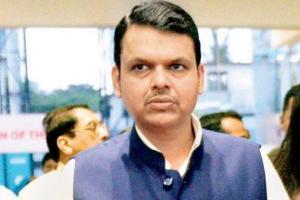Following increasing reports of botched implant surgeries, activist petitions PM and Union health minister for a single body to regulate doctors, drugs and medical devices

Devendra Fadnavis
There are medical devices and implants for nearly every purpose, whether it's a bad knee or birth control. But what happens when something goes wrong with the device? Who do patients turn to for justice? Inspired by news reports on botched implants, including articles by mid-day and the #Implant Files series of reports by The Indian Express and the International Consortium of Investigative Journalists, activists have floated an online petition to the Prime Minister Narendra Modi, calling for a comprehensive and effective regulator for drugs and medical devices along the lines of the Real Estate Regulatory Authority (RERA), which governs the real estate sector.
The petition, by activist B N Kumar, states that the medical devices market is currently governed by an archaic, nearly 80-year-old law, the Drugs and Cosmetics Act, 1940. The petition has also been mailed to Union Health Minister J P Nadda and Maharashtra Chief Minister Devendra Fadnavis. As the Express reported, despite an estimated 5,000 medical devices being sold in the country — ranging from bone caps, metallic prosthetics, fallopian rings to catheter guide wires — there are just 23 categories of medical devices that are "notified" and, therefore, regulated.
ADVERTISEMENT
mid-day report cited
The petition also referred to a mid-day report dated November 26: 'Chembur businessman gets life back year after botched knee surgery'. The report highlighted the plight of Kris Kesavan, 78, who underwent a bilateral knee replacement surgery at a city hospital in November 2015. The implant got infected, and he was prescribed heavy doses of antibiotics and sleeping pills for more than a year to help with the excruciating pain and other problems, until a corrective surgery resolved the problem.
Kesavan said, "The need of the hour is to introduce a quasi judicial body to ensure transparency and accountability in the medical field. This will not only bring transparency and accountability amidst doctors and pharma companies, but will also give a platform to grieving patients to be heard and given justice." The petition said there have been many cases of implant surgeries going haywire — some reported and many unreported. This calls for a strong regulatory system. "We request the government to set up a Drugs & Devices Regulatory Authority (DDRA) on the lines of RERA, which governs the real estate industry," Kumar said.
Referring to the gross neglect of the medical devices market and patients' interest, the petition said that the Medical Device Regulation Bill has awaited enactment for over 12 years. Though health is a state subject, the petition said the centre could enact a model law just as did in case of RERA and ask states to follow suit. "The Medical Council of India oversees only doctors and not devices. Isn't it of paramount importance that drugs, devices, doctors, hospitals and even medical shops are brought under a single, effective regulatory regime?" Kumar questioned.
Medical fraternity says
Dr Ketan Vagholkar, professor of surgery at D Y medical college, said, "A majority of recent technologies are industry driven, and in order to increase the profit margin, these companies make huge claims regarding the quality of their products or implants. Many surgeons get carried away by these misleading advertisements and use these products on their patients, only to find that the results are not at all appealing and, in fact, cause more complications. The need of the hour is to use time-tested implants or technology."
He added. "A quasi judicial medical body should be formed, comprising experts mainly from India, who have enough published experience regarding use of a product or implant. Products that work wonders on Western patients may not necessarily yield similar results in the Indian population." Dr Pradeep Bhosale, director of arthritis and joint replacement surgery at Nanavati Superspeciality Hospital, said, "It sounds like a welcome move, but practically fixing responsibility will be difficult, unless the body has experts from the Joint Replacement Society of India and Indian Society of Hip and Knee Surgeons (ISHKS). These are senior surgeons ought to be a part of such a quasi judicial body dealing with implants."
Catch up on all the latest Crime, National, International and Hatke news here. Also download the new mid-day Android and iOS apps to get latest updates
 Subscribe today by clicking the link and stay updated with the latest news!" Click here!
Subscribe today by clicking the link and stay updated with the latest news!" Click here!







